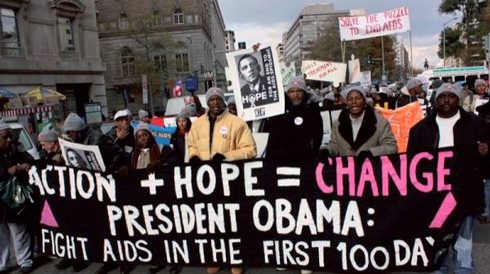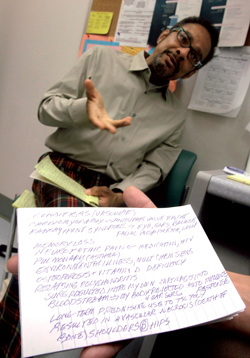By Charlene Muhammad CHARLENEM

(FinalCall.com) – After 30 years of the AIDS pandemic and billions of dollars for treatment, testing and education, Blacks are still disproportionately infected by HIV/AIDS in America.
Blacks make up approximately 14 percent of America’s population, yet account for almost half of those living with HIV (46 percent or approximately 545,000 people), according to the Centers for Disease Control.
Blacks represent nearly half of the country’s new infections each year (44 percent or approximately 21,200 people), according to November 2011 statistics by the CDC.
Part of the problem is while Blacks rank highest in numbers for HIV infections in the U.S., they are at the bottom of the barrel when it comes to receiving funding.
“World AIDS Day is a celebration for some and a memorial for others,” declared Tony Wafford of the New York-based National Action Network. As health and wellness director for its “I Choose Life” initiative, he works to develop national testing and prevention and education programs.
Despite advocates’ efforts to combat HIV/AIDS in the Black community, the numbers are staggering.
According to the CDC: Approximately one in 16 Black men will be diagnosed with HIV during their lifetime, as will one in 32 Black women. Black men account for 70 percent of new HIV infections and Black women 30 percent. Black women account for 57 percent of all new HIV infections among women.
In the early 1980s, people were dying at record rates from AIDS because the government didn’t want to talk about HIV but research and science helped reduce the number of infections for Whites, and Blacks benefitted some, Mr. Wafford said.

For Whites, including homosexuals, who contract HIV, there is cause to celebrate because they’re living longer, have access to more medications, have reduced their number of infections through research and science, and have used HIV as a springboard to address larger issues like gay marriage and social acceptance, according to Mr. Wafford.
Blacks have benefitted, too, but there’s still tragedy, he declared. “The people who don’t have money to afford the medications and are on a waiting list for free drugs are Black people. The fastest number of new infections among women are Black women. The fastest growing number of new infections among men who have sex with other men are Black men, so we have nothing to celebrate,” Mr. Wafford said.
Another obstacle in reducing HIV/AIDS infections among Blacks is a lack of funding for Black service providers, insist advocates like Cynthia Davis, an assistant professor in the College of Medicine and College of Science and Health at Charles R. Drew University of Medicine and Science in Los Angeles.
In 2013, President Barack Obama is allocating approximately $3.3 billion in discretionary funding to the Department of Health and Human Services for HIV/AIDS prevention and treatment. The aim is to expand access to affordable health care and treatment.
But federal, state and local funding rarely trickles down to Black communities and agencies in a way that allows them to make a very big difference, Ms. Davis said. In February 2011, she gave her staff two week layoff notices because she had no funding–like many other programs in South Los Angeles and so-called minority communities in L.A. County.
“I had no public or private sector funding last year and that was very stressful because the need is so great. The county told me it had no money but I turned to the Black Community Health Task Force that does have some weight, and all of a sudden, the county found some dollars and I didn’t have to shut down,” Ms. Davis said.
She is hoping for more resources so she can offer more HIV screening services and testing, such as the INSTI rapid HIV antibody test. Approved by the U.S. Food and Drug Administration in November 2010, the test is supposed to be able to detect antibodies to HIV in one minute.
The INSTI Test presents an opportunity for mass testing but a drawback is that a lot of Blacks have reservations about being stuck with needles and blood collection, so they prefer oral swab tests, Ms. Davis observed.
Due to limited resources, Ms. Davis has partnered with a local, major AIDS organization to offer the new test but in January 2013, it will be available through smaller clinics and mobile testing programs like hers.
As she prepares to provide the testing, she remains keenly aware of and prepares to work through the historical problems with Blacks and medicine. Some Blacks simply refuse to get HIV tests but advocates say they understandably attribute that to the “Tuskegee syndrome.”
Blacks’ fear of the dominant medical establishment–whether for examinations, treatment or medical trials–stems from the 1930s experiment in which government researchers allowed syphilis in Black men in Alabama to go untreated to study the effects of the disease. The Tuskegee Experiment lasted for 40 years.
“Not only Tuskegee, but people have valid reasons to be worried about whether or not they can trust the government, given the history of abuses that have occurred in the U.S. against people of color over the last 100 years,” Ms. Davis said.
Many Blacks still believe AIDS is a man-made virus created by the government as a form of genocide. After 30 years, people still raise the issue in education forums and at testing sites, which means there’s a lot to overcome, she continued.
Blacks have more political leaders than ever before and the ultimate, a Black president. So why can’t Blacks make up ground on the pandemic? advocates ask.
On the political front, congressional representatives are very concerned about the plight of Black people and HIV, but the conversation becomes difficult because it often transitions from treatment and care to homosexual behavior and what is normal, Mr. Wafford said.
Politicians don’t want to be accused of stigmatizing people on issues like gay marriage and adoptions, so they avoid the fight altogether, he said.
“Rather than say I’m supportive of testing, treatment, and care–all those things that come with people who are at risk and infected by HIV–but I’m not supportive of two men marrying each other, they will tell you my office is working on literacy, gang violence, homelessness, poverty. They don’t have to fight about that because that’s bipartisan,” Mr. Wafford told The Final Call.
But don’t just put the blame on Black political leaders and heterosexuals, he argued. Black homosexual leadership should raise its voice, too, he urged. “The White homosexual leadership has David Geffen, who spends an inordinate amount of his own money, time and energy around HIV, primarily as it affects gay White men. Elton John has the Elton John Foundation, which deals with HIV, primarily dealing with White men who have sex with other men,” Mr. Wafford noted.
He added, “So out of 43 million plus Black people in this country, why can’t you name me two major self-disclosed Black male homosexuals who are leading the charge and going to government, testifying in Senate and congressional hearings, to the needs of Black homosexuals in this country?”
But in the end, advocates warn Blacks must face up to their level of personal responsibility to beat HIV. That includes admitting to partners they’re engaged in risky behavior and addressing the rates of sexually transmitted diseases in the community.
Advocates note STDs are more prevalent than HIV and are often contracted before the disease, yet not enough people speak out about them.
“We can’t get away from personal responsibility … Pills and protests will not help you. You’ve got to be responsible,” Mr. Wafford said.
Related news:
Doctors fighting the spread of AIDS in Cuba (06-28-2012)
AIDS in the Caribbean ..a “man-made” virus? (FCN, 06-15-2012)
New CDC analysis reveals strong link between race, being poor and HIV infection rates (FCN, 07-30-2010)
AIDS is man-made – Interview with Dr. Boyd Graves (FCN, 10-05-2004)
Is AIDS the result of US Gov’t National Security Policy of Genocide?












